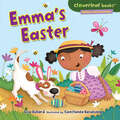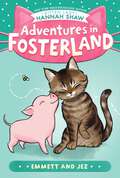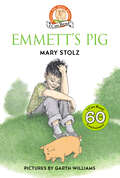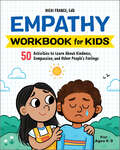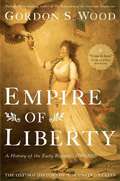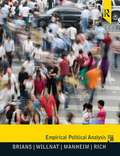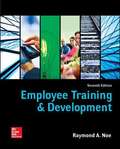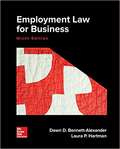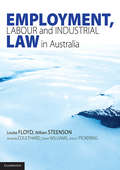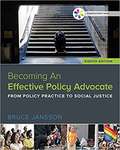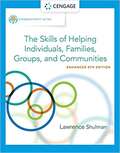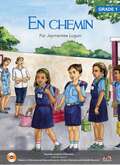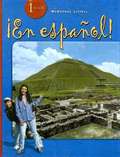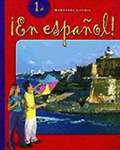- Table View
- List View
Emma's Easter (Cloverleaf Books (tm) -- Holidays And Special Days Ser.)
by Lisa Bullard Constanza BasaluzzoEmma's family is celebrating Easter! Emma and her little brother hunt for Easter eggs and candy. They go to church. Then relatives come over for a big meal. Find out the different ways people celebrate this special day!
Emma's Furry Coat (Fountas & Pinnell Classroom, Guided Reading)
by Kathleen Kemly Gayle PearsonNIMAC-sourced textbook
Emma's Paintings (Fountas & Pinnell Classroom, Guided Reading)
by Catherine Friend Sidney PaulNIMAC-sourced textbook
Emmanuel Yeboah's Incredible Ride (Fountas & Pinnell Classroom, Guided Reading)
by Laura JohnsonNIMAC-sourced textbook. ONE KID, ONE LEG, ONE MOTHER'S MESSAGE. Being born into severe poverty is hard enough. What if you were also born with only one working leg? Most people would probably give up— but not Emmanuel Yeboah.
Emmett and Jez (Adventures in Fosterland)
by Hannah ShawFrom New York Times bestselling author Hannah Shaw—also known as Kitten Lady—comes the first book in an exciting and heartwarming new chapter book series following kittens and other baby animals in Fosterland!When a tiny piglet named Emmett bounces off the truck carrying his mother and siblings, he&’s lost, hungry, and stuck on the side of the road. He has no idea where he&’s supposed to go, or where he belongs. Then a giant scoops Emmett up and takes him to a wonderful, magical place called Fosterland, where he meets a kitten named Jez. Emmett has a lot of questions, and once he hears all about life as a kitten, he decides it&’s much better than being a piglet. So, Emmett decides to just become a kitten instead! Problem solved. But as both Jez and Emmett grow older and realize they might be headed off to different forever homes, Emmett will have to confront his fears and face the scariest question of all: Is there a Foreverland out there for him?
Emmett's Pig (I Can Read Level 2)
by Mary StolzA sweet story for anyone who's ever dreamed of having a pet pigEmmett loves pigs and has all the toy pigs any kid could dream of. But Emmett wants a real pig. He lives in a New York City apartment, so Emmett’s family says that he can’t keep one in the house. Instead, on his birthday, his dreams will come true in the most surprising way!This Level Two I Can Read book is geared for kids who read on their own but still need a little help.This digital edition of the classic Emmett’s Pig by Mary Stolz and Garth William is a special commemorative edition celebrating the 60th anniversary of I Can Read books for beginning readers. The book features an anniversary burst and eight pages of bonus material on the history of I Can Read—including a timeline, origin stories of favorite characters, and never-before-seen early sketches.
Emmett's Scary Sleepover (Fountas & Pinnell Classroom, Guided Reading Grade 3)
by Eric Deschamps Lara AndersonNIMAC-sourced textbook
Emotion
by James W. Kalat Michelle N. ShiotaEmotion, Third Edition, offers a comprehensive and integrated survey of the field of affective science. The text covers the major theories of emotion in detail and reviews both classic and cutting-edge research on emotional processes from various subdisciplines. The authors' thoughtful engagement with ongoing controversies, contradictory findings, methodological limitations, and replication failures encourages critical thinking. While highly rigorous, the text is also student-friendly, with a light, humorous tone, real-world stories, and an intuitive structure. Emotion, Third Edition, addresses the questions undergraduates are most likely to ask: Why do we have emotions? How do they affect our lives? and How can we improve emotional well-being?
Empathy Workbook for Kids: 50 Activities to Learn About Kindness, Compassion, and Other People's Feelings (Health and Wellness Workbooks for Kids)
by Hiedi FranceEmpathy-building tools for kids ages 6 to 9Help young kids discover how to be kind as they develop their empathy skills and learn to handle difficult social situations. Created by a school psychologist, this top choice in empathy books for kids is full of fun exercises that teach kids how to understand and share what other people are feeling. The activities feature simple instructions so young learners can easily complete them and practice being thoughtful and considerate.This standout among empathy books for kids features:Active learning—Keep kids interested and enjoying themselves as they draw, take quizzes, practice listening skills, and more.A HEART-felt approach—Go beyond other empathy books for kids with exercises that break empathy down into five easy-to-understand concepts: Hearing, Experiencing, Active listening, Reflecting, and Taking action.Fun on every page—Playful language and colorful pictures help kids engage with the material, making it easier for them to learn.Teach kids to truly care about how other people feel with one of the best empathy books for kids available.
Empire of Liberty: A History of the Early Republic, 1789-1815
by Gordon S. WoodIntegrating all aspects of life, from politics and law to the economy and culture, "Empire of Liberty" offers a marvelous account of this pivotal era when America took its first unsteady steps as a new and rapidly expanding nation.
Empirical Political Analysis: Quantitative and Qualitative Research Methods (8th Edition)
by Craig Leonard Brians Lars B. Willnat Jarol B. Manheim Richard C. RichUpdated in a new 8th edition, Empirical Political Analysis introduces students to the full range of qualitative and quantitative methods used in political science research. Organized around all of the stages of the research process, this comprehensive text surveys designing experiments, conducting research, evaluating results, and presenting findings. With exercises in the text and in a companion lab manual, Empirical Political Analysis gives students applied insights on the scopes and methods of political science research.
Employee Training And Development (Seventh Edition)
by Raymond Andrew NoeCompanies that use innovative training and development practices are likely to report better financial performance than their competitors that do not. Training and development also help a company develop the human capital needed to meet competitive challenges. Many companies now recognize that learning through training, development, and knowledge management helps employees strengthen or increase their skills directly impacting their job performance, satisfaction, and career advancement.
Employment Law For Business
by Laura Hartman Dawn Bennett-AlexanderBennett-Alexander and Hartman's Employment Law for Business addresses employment law and employment decisions from a managerial perspective. This textbook shows students how to manage effectively and efficiently, with full comprehension of the legal ramifications of their decisions. Students learn to analyze employment law facts using concrete examples of thorny management-related legal dilemmas. The authors illustrate the various methods that can be used to reach a resolution, so that students understand how to make their own business decisions based on legal considerations. <p><p> The text discusses the complicated issues today's businesses face, such as whether employers are liable if they didn't know a supervisor was sexually harassing an employee and whether an employer is liable for racial discrimination for terminating a black male who refuses to abide by a "no-beard" policy. These types of questions, which are routinely decided in workplaces every day, can have devastating financial and productivity consequences if mishandled by employers. Yet, few employers or their managers and supervisors are equipped to handle them well. <p> This ninth edition has been updated to include cases such as the 2015 U.S. Supreme Court pregnancy case, Young v. UPS, and the 2015 U.S. Supreme Court Obergefell decisions prohibiting states from banning gay marriage, as well as current events, such as the 2016 presidential election and its effect on employment decisions. This edition also provides more in-depth coverage of recent issues, including technology and hiring assessment tools, criticisms of drug testing, and gender and age discrimination claims.
Employment Law: A Guide to Hiring, Managing, and Firing for Employers and Employees
by Lori B. RassasEmployment Law: A Guide to Hiring, Managing, and Firing for Employers and Employees offers a coherent overview that follows the sequence of day-to-day events--from job creation to recruitment, including compensation and benefits, leave entitlements, and more.
Employment, Labour and Industrial Law in Australia
by Daniel Williams Louise Floyd William Steenson Amanda Coulthard Anne C. PickeringEmployment, Labour and Industrial Law in Australia provides a comprehensive, current and accessible resource for the undergraduate and Juris Doctor student. With a social and political background to the law, this text provides insightful legal analysis underscored by practical business experience, while exploring key principles through a close evaluation of laws and lively discussion of prominent cases. Recognising the multi-faceted nature of the subject, the authors have included content on employment, labour and industrial law in the one text, while also presenting critical topics not often dealt with, namely: • current and In-depth analysis of trade union regulation • public work including the public sector, the judiciary and academics • workplace health and safety including worker's compensation, bullying, anti-discrimination and taxation • emerging issues including topics such as transnational and international employment law, migration and employment, as well as volunteers and work experience. To maintain currency within this rapidly changing area of law, the text has a website which will include updates for any major developments in the field as well as responses to end-of-chapter questions. Written by respected academics and practicing lawyers in the field, Employment, Labour and Industrial Law in Australia is a relevant and contemporary guide to this fascinating area of law. Explores employment, labour and industrial law in one volume. Contains current and in-depth analysis of trade union regulation. Includes content on the public sector, The Judiciary and academics, rarely covered in an undergraduate law text book.
Empowerment Series: Becoming An Effective Policy Advocate
by Bruce JanssonJansson's BECOMING AN EFFECTIVE POLICY ADVOCATE teaches you the ins and outs of conducting policy practice, preparing you to become an effective policy advocate during your own career. The eighth edition's coverage includes discussion of such events and issues as Barack Obama's presidency, the presidential primaries and election of 2016, the battle over equality among national politicians in 2016, and many issues facing social agencies. By going beyond the traditional foundational approach to policy, this text helps you develop the skills you need to become an advocate for social change. It offers you practical guidance on how to develop social media campaigns, and discusses ways you can participate in reducing inequality -- the issue that drew the attention of millions of millennials in the presidential election of 2016.
Empowerment Series: The Skills of Helping Individuals, Families, Groups, and Communities, Enhanced
by Lawrence ShulmanShulman's text introduces a model for the helping process based on an "interactional" approach, which uses a variety of theories and skills to build on the client-helper relationship. By presenting the core processes and skills in the chapters on work with individuals, Shulman shows how common elements exist across stages of helping and across different populations. These processes and skills reappear in the discussions of group, family, and community work.
Empress of African Song: The Miriam Makeba Story (Fountas & Pinnell Classroom, Guided Reading)
by Linda LundbergNIMAC-sourced textbook. SYMBOL OF HOPE. As a child, Miriam Makeba had the voice of an angel—strong and vibrant. In her home she sang freely; but in her native South Africa, Makeba was not free. Black Africans were oppressed by apartheid, a set of laws designed to restrict their human rights and silence their voices. As Makeba set out on a journey to share her native music with the world, she became the voice of an oppressed people and a symbol of hope for freedom.
En Chemin class 1 - MIE
by Par Jaymantee LugunLe livre "En chemin", destiné aux jeunes lecteurs, raconte l'histoire de Kevin qui rentre chez lui après l'école. Accompagné de sa mère, il observe les événements qui se déroulent le long du chemin. Ils rencontrent divers obstacles, notamment un camion en panne qui bloque la route. Malgré cela, Kevin se réjouit de retrouver son fidèle chien une fois arrivé chez lui. Ce livre géant, conçu pour stimuler la littératie chez les enfants, présente des illustrations réalistes pour aider à la compréhension du vocabulaire et encourage la participation des élèves en les engageant dans une série d'activités interactives. Tout au long de l'histoire, les moyens de transport et les expériences de Kevin sont utilisés comme points d'ancrage pour susciter la discussion et développer la compréhension linguistique des jeunes lecteurs.
En Espanol 1 (Texas Edition)
by Estella Gahala Patricia Hamilton Carlin Audrey L. Heining-Boynton Ricardo Otheguy Barbara J. RupertSpanish textbook for English-speaking students.
En Espanol 2 (Texas Edition)
by Estella Gahala Patricia Hamilton Carlin Audrey L. Heining-Boynton Ricardo Otheguy Barbara J. RupertA Spanish learning textbook for native English speakers.
En Espanol 3 (Texas Edition)
by Estella Gahala Patricia Hamilton Carlin Audrey L. Heining-Boynton Ricardo Otheguy Barbara J. RupertA English - Spanish learning textbook.
En Español Uno
by Estella Gahala Patricia Hamilton Carlin Audrey L. Heining-Boynton Mcdougal-Littell Publishing StaffA Spanish - English Text book.
